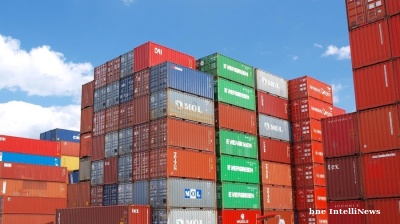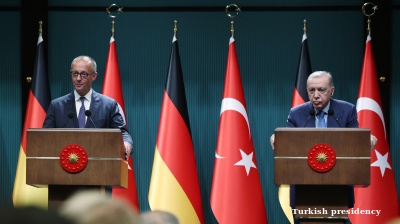Turkey undershoots market’s rate hike expectations as new economic team opts for ‘gradual’ normalisation

The Turkish central bank’s monetary policy committee (MPC) on June 22 brought in a policy rate cut far lower than most economists were expecting as part of Turkey’s telegraphed U-turn away from unconventional economic policies, reducing the benchmark by 650bp to 15% from 8.50% (chart).
The market expectation was for a rate hike to somewhere between 15% and 25%, thus the central bank only caught the heel of the bottom of the range.
Following the rates announcement, the USD/TRY rate on the interbank market moved into the 24s from the 23s. A new record high of 24.83 was registered.
Previously, the rate jumped by 6% d/d into the 23s on June 7 and more or less remained there.
Despite the Erdogan regime’s latest retreat into economic orthodoxy, it can be said that Turkey’s FX market is still not free. Officials are still controlling the interbank market via government-run banks.
Amid the booming lira supply and hard currency outflows via unprecedented trade deficits, these officials have only managed to keep a slippery grip on the lira by strong-arming bankers into blocking (non-capital controls) and suppressing (macroprudential measures) domestic FX demand. Also supportive are unidentified inflows and other assistance from “friendly countries”.
Monetary tightening will be further strengthened as much as required in a “gradual” manner, read the statement from the MPC released with the rates decision.
If the rate hikes are delivered gradually, the portfolio inflows into Turkey will be limited. The finance industry will hold back until the policy rate reaches its peak.
The strong course in domestic demand, cost pressures and the stickiness of services inflation have been the main drivers in Turkey’s inflationary trend, the MPC also noted.
The committee anticipated that the deterioration in pricing behaviour will put further pressure on inflation.
The monetary tightening process will increase the effectiveness of monetary policy, according to the MPC.
The central bank will continue to support strategic investments. It extends loans to companies under the Advance Loans Against Investment Commitment (Yatirim Taahhutlu Avans Kredisi/YTAK) scheme.
The committee will simplify and improve the existing micro- and macroprudential framework. The simplification process will also be “gradual”.
The committee said it would take decisions in a predictable, data-driven and transparent framework.
The MPC meeting saw newly appointed central bank governor Hafize Gaye Erkan’s take her first rate-setting decision and deliver her first policy communication to the markets. The next MPC meeting is scheduled for July 20. As things stand, an additional 5 pp hike appears to be on the way.
Prior to the meeting, Erkan delayed her first meeting with local bankers to June 23, while local daily Ekonomi reported that she held a series of phone calls with the research department heads of international investment banks.
The governor has asked bankers for their assessments on Turkey. The bankers have emphasised the importance of bringing in a rate hike and have expressed their concerns about the current account deficit.
Ekonomi also reported that Deutsche Bank has arranged a meeting between international investors and new finance minister Mehmet Simsek, like Erkan a former Wall Street banker. It did not say when the meeting would take place.
Also on June 22, Simsek was in the UAE together with Turkish Vice President Cevdet Yilmaz.

Photo: Simsek (second left) in the UAE. (Credit: Official photo).
Following the rate hike, Simsek (@memetsimsek), who so far since taking the finance post after the late May re-election of President Recep Tayyip Erdogan, has only communicated via Twitter, put out a four-tweet salvo, following the rate hike.

Tweet: Simsek is expecting capital inflows in “very serious” amounts.
Essentially, Turkey’s policy rate still remains idle on the sidelines, but the central bank is back in the game. The policy rate is also subject to the “gradual” path, meaning monetary policy is still conducted via macroprudential measures and non-capital controls. Here the word “gradual” also applies. They are to be lifted in a “gradual” manner.
To recap. Turkey’s finance minister headed to the UAE on the very day the latest Erdogan administration and its new economic team went through their first rate-setting meeting. Ahead of the big event, the central bank governor was talking to foreign bankers while cancelling her meeting with local bankers.
The message is clear. The finance minister’s role is to work “friendly countries” while the governor’s task is to work the global finance industry. Simsek will also support the governor’s efforts with the upcoming Deutsche Bank-arranged meeting.
The over-riding aim is to find some FX. The messages about the hyperinflationary environment or the other economic difficulties are simply about talking the talk in a politically correct manner.
For May, the Turkish Statistical Institute (TUIK, or TurkStat) released official consumer price index (CPI) inflation at 39.59% y/y.
On May 4, the central bank left its expectation for end-2023 official inflation unchanged at 22% (upper boundary: 27%).
The guidance was based on the assumption that the lira will not experience another crash. As of June 22, the USD/TRY rate was up by 26% to TRY 24.65 from 19.49 on May 4.
On July 27, Erkan will release her first inflation report and the central bank’s updated inflation forecasts.
In parallel with the lira depreciation, gasoline prices in Turkey have risen by 24% since the beginning of May. Diesel prices are up 33%.
.png)
Chart: Fuel prices in Turkey.
As of July 1, the net minimum wage will increase by 34% to TRY 11,403.

Chart: Net minimum wage in Turkey.
Earlier this month, tea product prices were hiked by 43% on average.
The Turks, meanwhile, are still piling up cryptocurrency, cars and gold. The KKM FX-protected deposits scheme rose to TRY 2.63 trillion as of June 16 from TRY 2.5 trillion as of May 26 while the USD-denominated amount declined to $112bn thanks to the lira depreciation.
As of June 16, the KKM accounts for 23% of total deposits, down from 24% a month ago because of the depreciation. The share of FX-linked deposits rose to 43% from 39% a month ago due to the lira depreciation. Also due to the depreciation, as of June 16, overall dollarisation rose to 66% from 65% on June 2.
To help break FX demand, the government has also permitted local banks to introduce higher lira deposit rates. As of June 16, the weighted average lira deposit rate with maturities of up to three months reached 41%.
Consumer loan rates are also moving up while commercial loan rates remain flat.

The central bank’s net FX reserves turned to a positive $0.5bn as of June 16. A fresh record low was registered at minus $6bn on June 2.
As a result, net reserves excluding swaps (swaps are off-balance sheet items, thus it is necessary to exclude swaps from balance sheet positions to reach actual figures) extended to minus $60.5bn. A record low of minus $62.3bn was registered on June 9.
The gross reserves rose to $103bn as of June 16 from $98bn as of May 26. The figure stood at $130bn as of February 3.
Sentiment on the global markets remains turbulence-free. Turkey’s five-year credit default swaps (CDS) are moving around the 500-level, while the yield on the Turkish government’s 10-year eurobonds is around the 9%-level.
On May 24, unnamed sources told Bloomberg that Turkey’s central bank asked some local lenders to buy the country’s dollar bonds to prevent a CDS spike.
Data
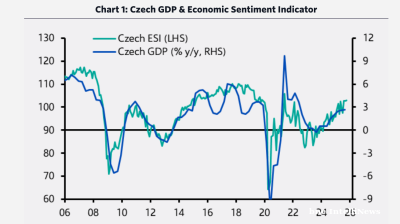
Czech growth accelerates as domestic demand-side pressure builds
The Czech economy delivered an unexpected acceleration in the third quarter, marking a clear shift from its earlier position as a regional underperformer to one of Central and Eastern Europe’s fastest-growing economies.
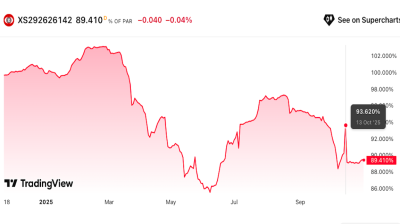
Eurobonds of Istanbul-listed Zorlu units offer attractive yields amid rating downgrades and no default expectation
Debut paper currently offering 14-15% yield.
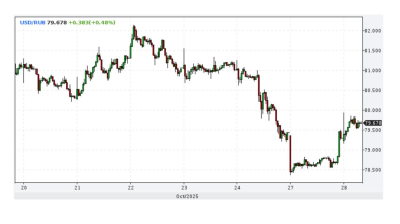
Ruble strengthens as sanctioned oil companies repatriate cash
The Russian ruble strengthened after the Trump administration imposed oil sanctions on Russia’s leading oil companies, extending a rally that began after the Biden administration imposed oil sanctions on Russia in January.

Russia's central bank cuts rates by 50bp to 16.5%
The Central Bank of Russia (CBR) cut rates by 50bp on October 24 to 16.5% in an effort to boost flagging growth despite fears of a revival of inflationary pressure due to an upcoming two percentage point hike in the planned VAT rates.
